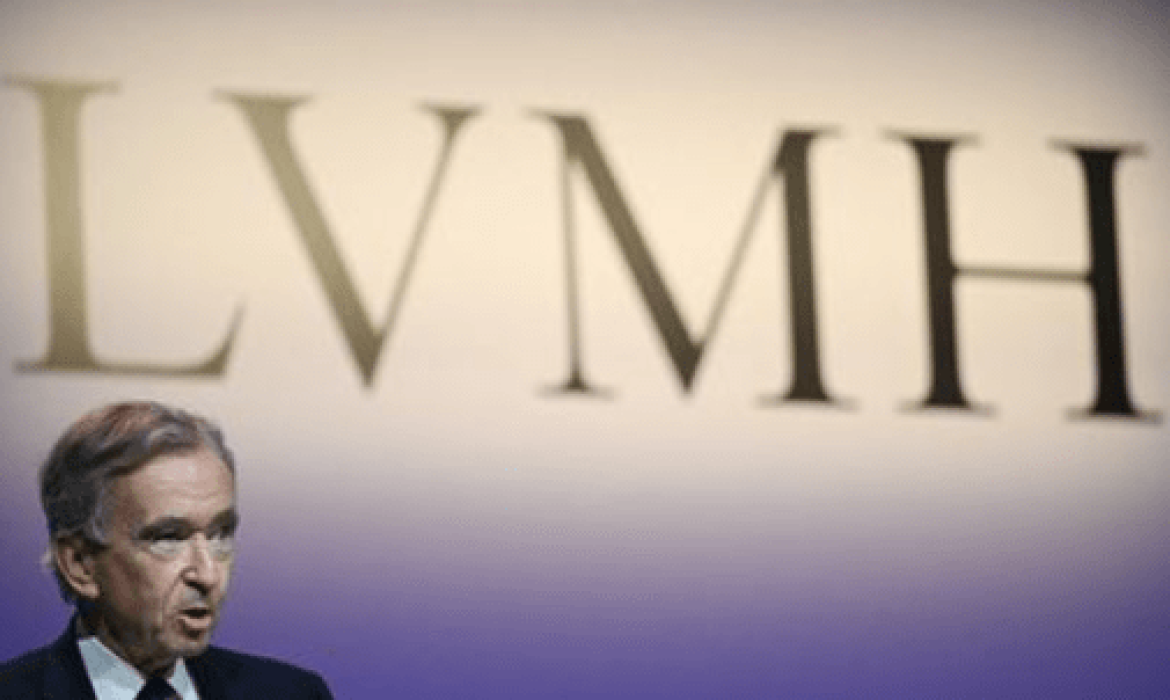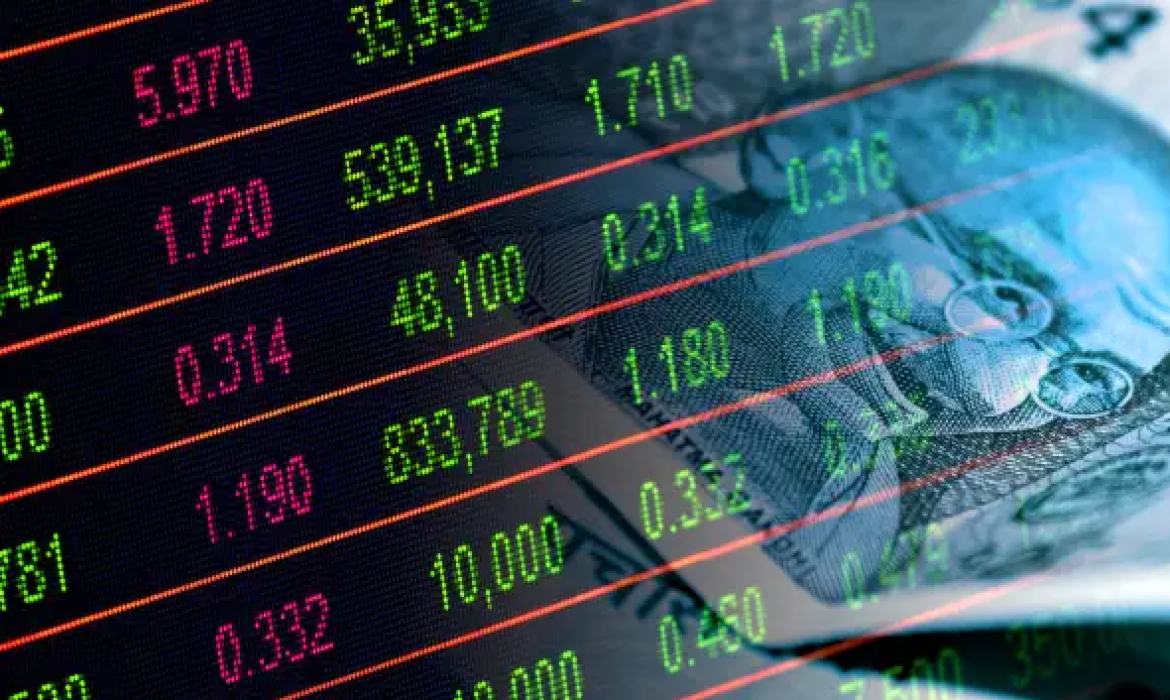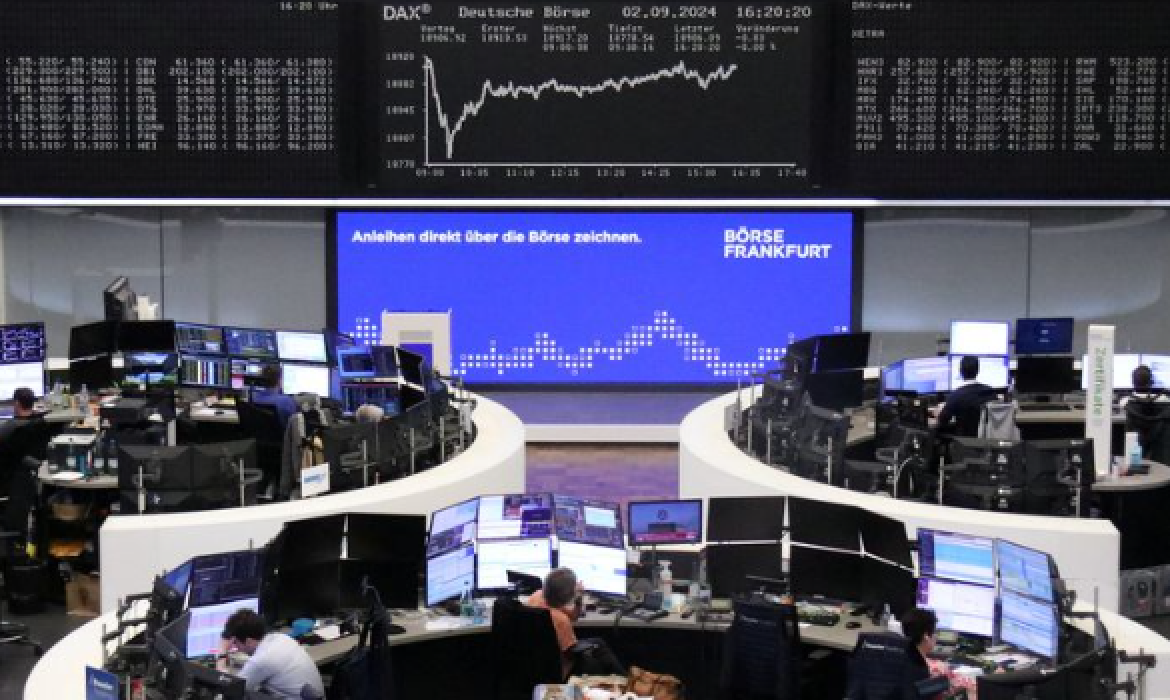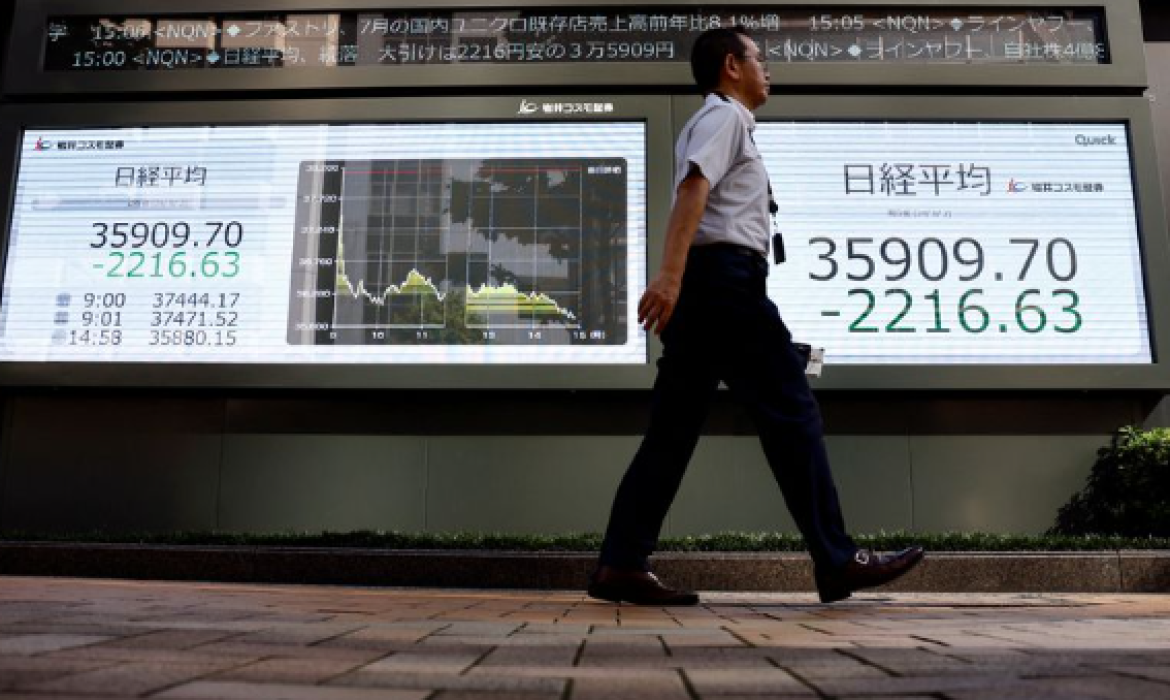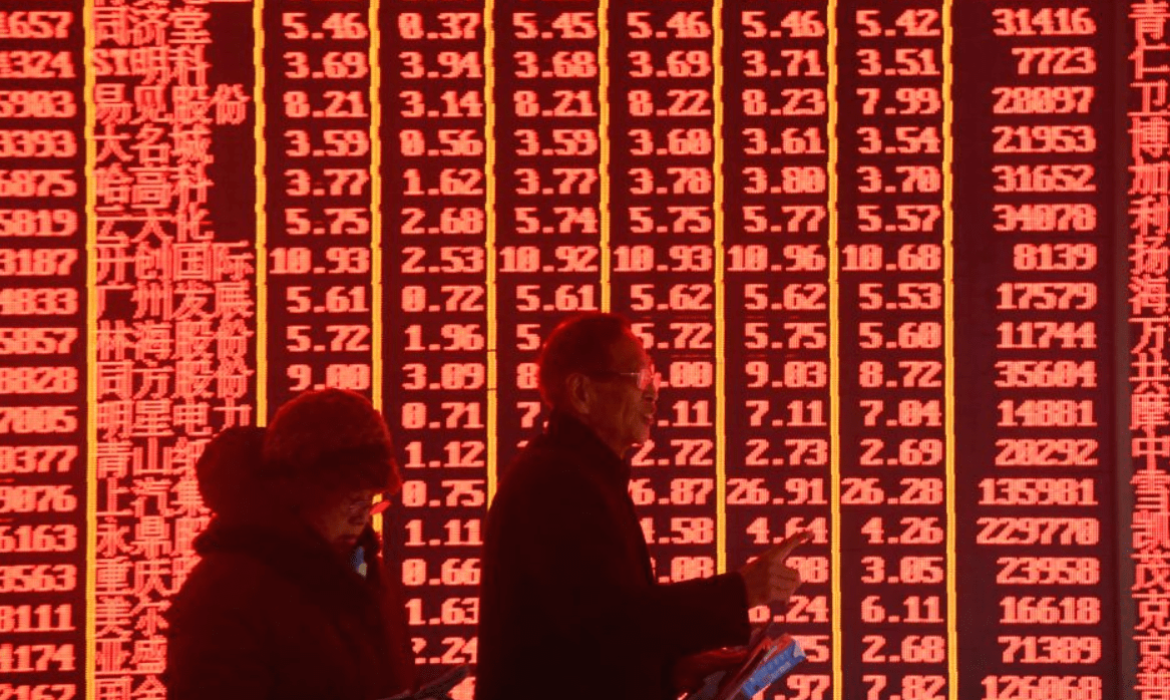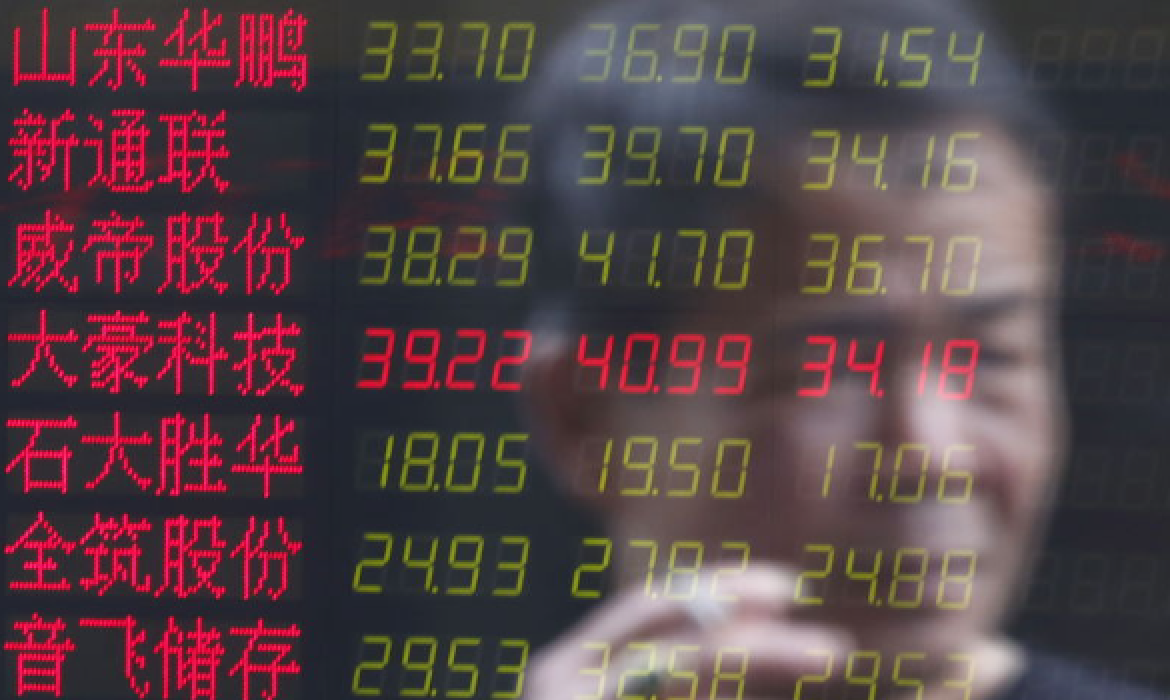Daily Synopsis of the New York market close
Date Issued – 18th October 2024
Preview
This newsletter brings you in-depth insights into Netflix’s Q3 performance, Bridgewater’s remarkable fund returns, Samsung’s delayed ASML deliveries, Swiss sanctions investigations, and Berkshire Hathaway’s continued divestment from Bank of America. Let’s explore these critical market updates:
Netflix Beats Subscriber Growth Expectations in Q3
Netflix exceeded expectations in Q3 2024, adding 5.1 million new streaming subscribers, surpassing Wall Street’s forecast by 1 million. This strong growth brought Netflix’s total global subscriber base to 247.15 million, reflecting a 10.8% increase year-over-year. Revenues rose by 7.8% to $8.54 billion, while earnings per share hit $3.73, also beating expectations. Netflix’s success can be attributed to its ad-supported tier, which continues to gain traction, and its strategy to monetize password-sharing. Furthermore, Netflix’s expansion into international markets has bolstered its subscriber growth, allowing it to compete more effectively in a crowded streaming market. The company remains optimistic about its future, particularly as it continues to invest in content production and diversify revenue streams.
Investment Insight: Netflix’s impressive subscriber growth highlights its resilience against fierce competition in the streaming industry. Investors should consider the impact of its ad-supported tier and content investments as long-term growth drivers.
Market Price: Netflix (NFLX): $408.50
Bridgewater’s All Weather Plus Fund Posts Strong Returns
Bridgewater’s All Weather Plus strategy has delivered impressive results, recording a 19% return before fees in September, bringing its total gain for the first nine months of 2024 to 31%. The systematic All Weather multi-asset portfolio contributed 8% to the returns, while active management added another 10.8%, driven by gains in both equities and bonds. Bridgewater’s strong performance showcases its ability to navigate volatile markets and capitalize on opportunities across multiple asset classes. The firm has also increased its onshore assets in China to over 40 billion yuan ($5.6 billion) earlier this year. Bridgewater’s portfolio remains “moderately” long on short-term bonds, as it expects policymakers to remain supportive of global economic growth.
Investment Insight: Bridgewater’s strong performance this year highlights the benefits of a diversified, multi-asset approach. Investors looking for a hedge against market volatility might find Bridgewater’s strategy appealing, particularly in a challenging economic environment.

Samsung Delays ASML Deliveries Amid Lack of Customers for Texas Plant
Samsung Electronics has postponed taking deliveries of advanced chipmaking equipment from ASML for its new $17 billion factory in Taylor, Texas. This delay stems from the fact that Samsung has yet to secure major customers for the plant, casting uncertainty over the project’s timeline. Additionally, Samsung has paused orders with other suppliers, prompting some to withdraw staff from the construction site. The delay marks a setback for Samsung’s ambitions to expand its contract chip manufacturing business, which is dominated by Taiwan’s TSMC. The situation also underscores the growing divide between Samsung and competitors like TSMC and SK Hynix, who are ramping up production of advanced chips to meet the soaring demand driven by AI applications. ASML, the world’s largest supplier of chipmaking equipment, recently lowered its 2025 sales forecast due to weakened demand outside of the AI sector.
Investment Insight: Samsung’s delays in equipment deliveries highlight the challenges faced by chipmakers, especially in securing key customers for major projects. Investors should watch how this impacts both Samsung’s expansion plans and ASML’s revenue forecasts as the semiconductor industry adjusts to shifting demand.
Market Price: ASML (ASML): €570.00
Swiss Authorities Probe Firms Evading Russian Sanctions
Swiss regulators have launched investigations into several firms suspected of circumventing international sanctions against Russia. These companies are believed to have used complex corporate structures to evade restrictions, particularly those related to trade and financial dealings. Switzerland, which has long been a global financial hub, is under increasing pressure to ensure that companies operating within its borders fully comply with the sanctions imposed on Russia after its invasion of Ukraine. The investigations could lead to severe penalties for firms found in violation of these restrictions, underscoring the challenges of enforcing global sanctions in complex international markets.
Investment Insight: Investors should be mindful of the regulatory and reputational risks associated with firms operating in sanction-sensitive markets. The outcomes of these investigations could have significant implications for businesses with exposure to Russia or markets under similar sanctions.
Berkshire Hathaway Reduces Bank of America Stake Further
Warren Buffett’s Berkshire Hathaway has continued to reduce its stake in Bank of America, selling a substantial portion of its shares in Q3 2024. Although Berkshire remains one of the largest shareholders in the bank, this move marks a continued shift away from financial stocks. The decision to trim its stake comes amid rising interest rates and regulatory pressures in the banking sector. Berkshire’s broader portfolio adjustments reflect its increasing focus on other sectors, such as energy and consumer goods, where it sees more growth potential. While Bank of America remains a solid performer, the financial sector faces challenges in adapting to the current economic environment.
Investment Insight: Berkshire’s decision to reduce its exposure to Bank of America could be an indicator of concerns about the future of the banking sector in a high-interest-rate environment. Investors should carefully consider how rising rates and increased regulation may affect financial stocks in the near future.
Market Price: Bank of America (BAC): $28.45
Conclusion
Today’s market developments span critical areas such as technology, finance, and regulatory shifts. Staying informed about these trends will help guide your investment strategy in the weeks ahead. As always, our team is available to provide further insights or discuss portfolio adjustments.
Find below some of our Buy/Sell Recommendations. Balfour Capital Group is a distinguished global boutique investment management firm with $400 million AUM and over 1000 Clients.
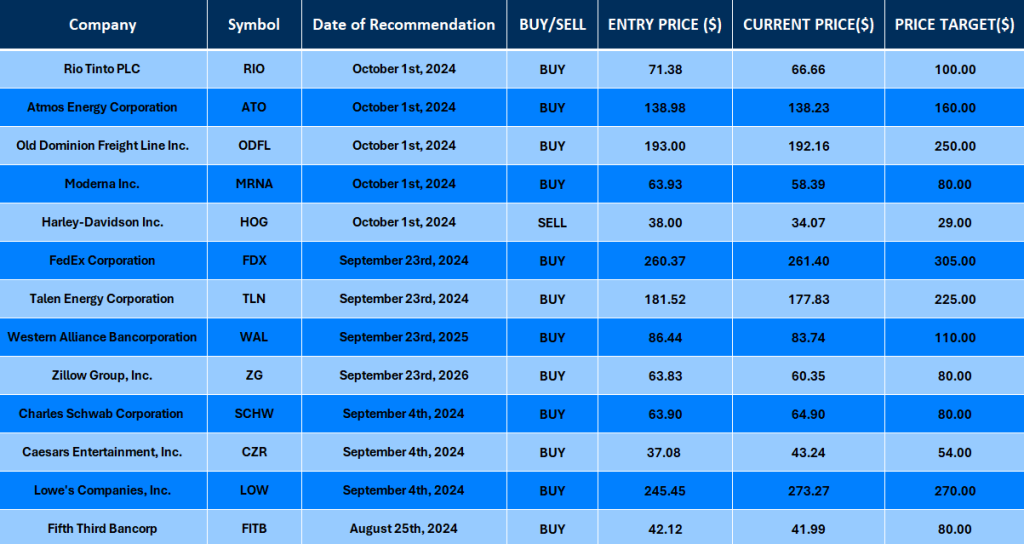
Disclaimer: This post provides financial insights for informational purposes only. It does not constitute financial advice or recommendations for investment decisions.
Daily Synopsis of the New York market close
Date Issued – 17th October 2024
Preview
This newsletter covers TSMC’s earnings report, developments in the US oil sector, Schneider Electric’s latest acquisition, Nestlé’s missed sales forecasts, and the recent slide in luxury stocks. Here’s what you need to know:
TSMC Q3 Results Highlight Weaker Demand
Taiwan Semiconductor Manufacturing Company (TSMC) reported Q3 2024 earnings that were in line with expectations but showed weakening demand across key segments like smartphones and personal computers. While the company posted revenues of $17.3 billion, there was a noticeable decline in orders from major clients such as Apple, reflecting softer demand in consumer electronics. TSMC’s leadership acknowledged these headwinds but remained confident that future growth would be driven by artificial intelligence (AI) chips and advanced semiconductor technologies for data centers. The short-term challenges, however, have led to some concerns about the company’s profitability over the next few quarters.
Investment Insight: While TSMC’s future in AI and advanced chips remains strong, investors should weigh this against current demand pressures in the consumer electronics space.
Market Price: TSMC (TSM): $187.48
US Oil Sector Faces Shifts as Phillips 66 Closes California Refinery
Phillips 66 announced the closure of its refinery in Rodeo, California, marking a significant shift in the company’s strategy as it transitions from traditional fossil fuels to renewable energy sources. This move reflects a broader trend within the energy sector, where oil companies are adapting to stricter environmental regulations and growing demand for cleaner energy. Analysts expect this closure could contribute to higher fuel prices on the West Coast due to reduced refining capacity. Despite this, oil prices have remained stable, but the closure underscores the balancing act the US oil industry faces between maintaining supply and transitioning to renewable energy.
Investment Insight: Investors should keep an eye on the impact of refinery closures on fuel prices and how Phillips 66 navigates the shift toward renewable energy.
Market Price: Phillips 66 (PSX): $132.31
Schneider Electric to Acquire Data Center Cooling Firm
Schneider Electric has taken a strategic step by announcing plans to acquire a leading data center cooling company, solidifying its position in the digital infrastructure and energy management space. The growing demand for data centers, fueled by cloud computing and artificial intelligence, has increased the need for advanced cooling systems that are energy-efficient and reliable. Data centers consume vast amounts of energy, and cooling is a critical component of their operational efficiency. Schneider’s acquisition highlights the company’s ambition to expand its footprint in the data center industry and meet the growing demand for energy-efficient solutions.
Investment Insight: This acquisition could offer strong growth potential as data centers expand globally, presenting a long-term investment opportunity in Schneider Electric.
Market Price: Schneider Electric (SND): €244.50

Nestlé Misses Sales Forecast Amid Slower Consumer Spending
Nestlé’s Q3 2024 earnings report revealed weaker-than-expected sales growth, with the company falling short of its forecast due to slowing consumer demand and higher input costs. Despite posting a 3.5% sales growth, inflationary pressures in key markets such as Europe and the U.S. led to reduced consumer spending on discretionary items. Nestlé’s decision to raise prices to offset higher production costs has further dampened demand for its products. The company plans to focus on premium offerings and operational efficiencies to regain momentum, but the current macroeconomic environment remains a significant challenge for the global food giant.
Investment Insight: Nestlé’s struggles are reflective of broader trends in the consumer goods sector, where inflation and economic uncertainty continue to weigh on sales.
Market Price: Nestlé (NESN): CHF 85.84
Luxury Stocks Slide as LVMH Disappoints
Luxury stocks faced a sell-off after LVMH, the world’s largest luxury goods conglomerate, posted disappointing Q3 sales. The weaker-than-expected performance was attributed to slowing demand in major markets like China and the U.S., where high-end consumers are becoming more cautious amid economic uncertainty. LVMH’s earnings miss has also affected other luxury brands such as Kering and Richemont, leading to a broader decline in the luxury sector. Investors are now questioning whether this slowdown is temporary or indicative of a longer-term shift in luxury spending behavior, especially in key regions like China, where economic growth has been slower than expected.
Investment Insight: Investors should be cautious as the luxury sector shows signs of vulnerability to economic headwinds, particularly in key markets like China.
Market Price: LVMH (MOH): €608.10
Conclusion:
Recent market trends point to shifting dynamics across technology, energy, consumer goods, and luxury sectors. Keeping an eye on these developments will help guide investment strategies in the coming weeks. As always, our team is here to provide further insights or discuss portfolio adjustments.
Upcoming Dates to Watch:
- October 19: China Q3 GDP report release.
- October 20: ECB interest rate decision.
- October 24: Tesla Q3 earnings report.
Find below some of our Buy/Sell Recommendations. Balfour Capital Group is a distinguished global boutique investment management firm with $400 million AUM and over 1000 Clients.

Disclaimer: This post provides financial insights for informational purposes only. It does not constitute financial advice or recommendations for investment decisions.
Daily Synopsis of the New York market close
Date Issued – 16th October 2024
Preview
This newsletter covers key developments over the last 24 hours, including ASML’s earnings report and stock fall, UK inflation rates, earnings from Johnson & Johnson and Bank of America, Hong Kong’s housing affordability measures, and Walgreens’ decision to close stores. Here’s what you need to know:
ASML Stock Falls After Q3 Earnings Miss
ASML, a key player in the global semiconductor industry, reported a sharp decline in stock price after missing Q3 2024 earnings expectations. The company’s revenue of €6.7 billion fell short of analysts’ predictions, largely due to delays in the delivery of its advanced lithography machines, which are crucial to chip manufacturing. Supply chain disruptions and slower-than-expected demand from semiconductor producers contributed to the earnings miss. The company also lowered its full-year revenue forecast, citing near-term challenges in the semiconductor industry, though its long-term outlook remains optimistic due to the increasing demand for AI chips and 5G technology. Analysts are now assessing how ASML’s near-term struggles may reflect broader trends in the semiconductor market.
Investment Insight: ASML’s recent performance underscores potential weaknesses in the semiconductor sector, which could present risks or opportunities depending on how the market evolves.
Market Price: ASML (ASML): € 641.50
UK Inflation Falls to 1.7%, Boosting Market Confidence
The UK’s inflation rate has dropped to 1.7% in September 2024, marking its lowest level in two years. This decline comes as energy prices continue to stabilize, and food costs ease after months of upward pressure. The lower inflation rate has reduced the likelihood of further interest rate hikes by the Bank of England, which previously raised rates to combat persistent inflation. The slowdown in inflation is seen as a positive sign for the UK economy, potentially boosting consumer spending and economic growth. Many economists now believe that the UK may avoid a recession, a concern that had been mounting over the past year due to rising living costs and slowing wage growth.
Investment Insight: The fall in inflation could improve the outlook for consumer-facing sectors, including retail and hospitality, making UK equities in these industries more attractive to investors.
Market Price: FTSE 100: £9,149.16
Johnson & Johnson Posts Strong Q3 Earnings Despite Industry Challenges
Johnson & Johnson delivered better-than-expected earnings for Q3 2024, reporting a 5% year-over-year increase in revenue, which reached $25 billion. The company’s pharmaceutical division led the charge, with key drugs in oncology and immunology driving strong sales. J&J’s medical device segment also saw growth, benefiting from increased demand for surgical tools and devices. The company raised its full-year earnings forecast, indicating confidence in its ability to navigate ongoing challenges in the healthcare sector, such as cost pressures and supply chain disruptions. Investors were encouraged by J&J’s diversified business model, which allows it to weather volatility in any single market segment.
Investment Insight: Johnson & Johnson’s resilience and growth in key divisions make it a solid pick for investors looking for stability in the healthcare sector, particularly in pharmaceuticals and medical devices.
Market Price: Johnson & Johnson (JNJ): $164.10
Walgreens to Close 1,200 Stores in Cost-Cutting Move
Walgreens announced it will close 1,200 stores over the next three years as part of a broad cost-cutting initiative. The decision comes as the pharmacy chain grapples with declining foot traffic, rising costs, and increased competition from online pharmacies. Walgreens’ move to shrink its brick-and-mortar presence is aimed at improving profitability and shifting more focus to its growing digital and healthcare services. The closures are expected to save the company significant operational costs, though they may also lead to revenue losses from reduced physical store sales. Walgreens’ management believes the cost-saving strategy will allow it to invest more in digital innovation and patient care.
Investment Insight: Walgreens’ shift towards digital healthcare services could offer long-term growth potential, but the near-term store closures may present challenges for investors seeking immediate returns.
Market Price: Walgreens Boots Alliance (WBA): $10.42
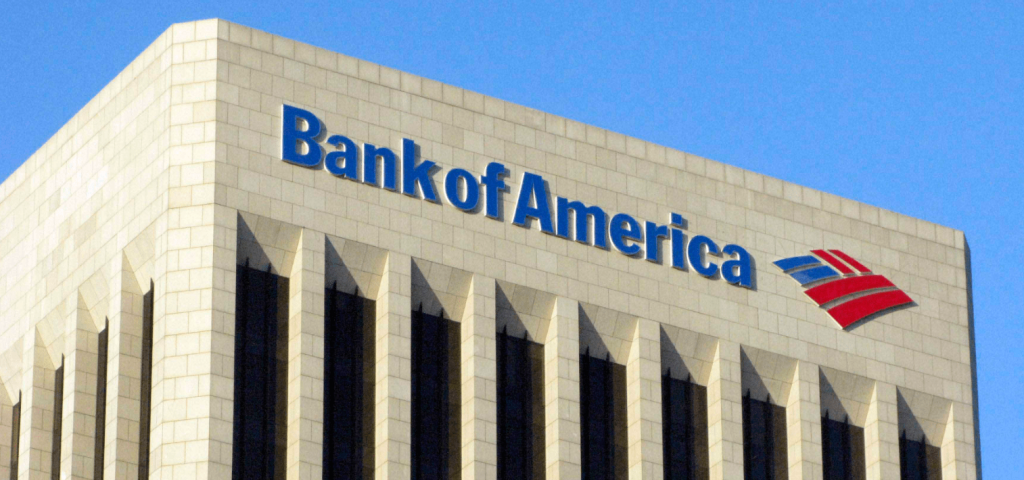
Bank of America Beats Earnings Expectations as Interest Income Rises
Bank of America posted a strong Q3 2024 earnings report, with net income increasing by 9% compared to the previous year, bringing total revenue to $25.3 billion. The bank’s results were driven by higher interest income, boosted by the Federal Reserve’s interest rate hikes earlier in the year. Additionally, the bank saw growth in its wealth management and investment banking divisions, further contributing to the better-than-expected earnings. Despite a challenging economic environment, Bank of America’s focus on cost management and its diversified business lines helped mitigate potential risks. The bank also benefited from an increase in loan demand, particularly in the commercial and real estate sectors.
Investment Insight:
Bank of America’s performance shows the continued strength of the financial sector, especially in an environment where higher interest rates boost income. Investors may want to keep an eye on how the bank manages rising loan demand in the coming quarters.
Market Price: Bank of America (BAC): $242.14
Hong Kong Implements Housing Affordability Measures
In response to rising housing prices and growing public dissatisfaction, the Hong Kong government has unveiled new measures to address housing affordability. These include subsidies for first-time homebuyers, incentives for developers to build affordable housing, and rezoning land for residential use. Hong Kong’s property market remains one of the most expensive in the world, with home prices far outpacing local incomes. The government’s initiatives aim to increase homeownership rates and alleviate the financial strain on residents. Analysts believe these measures could provide a much-needed boost to the real estate market by stimulating demand for lower-cost housing.
Investment Insight:
Hong Kong’s real estate sector could see increased activity as these new policies encourage more affordable housing developments, creating potential opportunities for investors in the housing market.
Market Price: Hang Seng Index: HKD 20,286.85
Conclusion:
Recent market developments reflect a broad array of challenges and opportunities across sectors. Whether in technology, finance, healthcare, or real estate, staying informed on key trends is essential for effective investment strategy.
Upcoming Dates to Watch:
- October 19: China Q3 GDP report release.
- October 20: ECB interest rate decision.
- October 24: Tesla Q3 earnings report.
Find below some of our Buy/Sell Recommendations. Balfour Capital Group is a distinguished global boutique investment management firm with $400 million AUM and over 1000 Clients.

Disclaimer: This post provides financial insights for informational purposes only. It does not constitute financial advice or recommendations for investment decisions.
Daily Synopsis of the New York market close
Date Issued – 15th October 2024
Preview
This newsletter covers critical developments in the markets over the past 24 hours, including Ericsson’s strong Q3 performance, a steep decline in China’s stock market, the S&P 500 reaching an all-time high, Google’s new energy deal, and shifting oil prices. Here’s what you need to know:
Ericsson Exceeds Q3 2024 Expectations
Ericsson delivered stronger-than-expected results for Q3 2024, with net income surging to SEK 4.5 billion. The Swedish telecom giant’s performance was buoyed by higher 5G infrastructure sales in key markets like North America and Europe. The company’s ongoing cost-cutting measures and operational improvements also contributed to the earnings beat. Ericsson’s strategic focus on securing major telecom contracts has been instrumental in bolstering its financial outlook. Despite global macroeconomic challenges, Ericsson maintained its position as a leading 5G provider, which bodes well for its long-term growth prospects. Investors and analysts alike are keeping a close eye on the company’s future guidance, which remains positive.
Investment Insight: With Ericsson’s stellar Q3 results, investors looking to capitalize on the 5G rollout may find this an opportune moment.
Market Price: Ericsson (ERIC): SEK 84.32
China Stocks Plunge Amid Economic Worries
China’s stock market faced a sharp sell-off on October 14, with the CSI 300 dropping 2.2% and the Hang Seng Index plunging 3.9%, marking the worst trading day in over a year. Investors are increasingly pessimistic about China’s economic outlook, particularly in the property sector, which continues to struggle. Furthermore, the decision by the People’s Bank of China to leave interest rates unchanged—contrary to expectations of a cut—has further dampened market sentiment. Global investors sold approximately $1.8 billion in Chinese equities as concerns about growth and government policy persisted. Analysts are now debating the potential effectiveness of future stimulus measures.
Investment Insight: Investors should remain cautious as China’s economy faces multiple headwinds, though this volatility could also present buying opportunities in undervalued sectors.
Market Price: CSI 300 Index: 3,856.07 CNY
S&P 500 Hits Record High on Economic Optimism
The S&P 500 reached a new all-time high on October 14, signaling strong investor confidence in the U.S. economy’s resilience. Gains in technology and consumer discretionary sectors drove the surge, with companies like Apple and Amazon leading the charge. A combination of lower inflation and expectations that the Federal Reserve may pause further rate hikes has helped fuel the market rally. The index’s recent milestone also coincides with the beginning of corporate earnings season, which many believe will continue to provide positive momentum for the market. This new high reflects optimism that the U.S. economy is navigating inflationary pressures better than anticipated.
Investment Insight: The S&P 500’s recent performance suggests potential growth in tech and consumer stocks, making them key areas for investors to watch.
Market Price: S&P 500: 5,859.85 USD
Google Signs Deal to Power Data Centers with Nuclear Fusion
Google has announced a landmark deal with Helion Energy, a nuclear fusion startup, to power its data centers with fusion energy by 2028. This partnership reflects Google’s growing commitment to sustainable energy solutions and reducing its carbon footprint. Helion Energy is at the forefront of nuclear fusion technology, which promises to provide cleaner and more abundant energy compared to traditional methods. If the technology becomes commercially viable by the projected timeline, it could revolutionize how large tech companies manage their energy needs. This collaboration also puts Google at the forefront of tech sustainability efforts, potentially giving it a competitive edge in the years to come.
Investment Insight: While Google remains a key player in AI and cloud technologies, its bold move toward nuclear fusion showcases its commitment to long-term environmental sustainability.
Market Price: Alphabet Inc. (GOOGL): $164.96 USD
Oil Prices Dip on Global Demand Concerns
Oil prices experienced a slight dip on October 14, with Brent crude dropping to $73.92 per barrel, driven by concerns over weakening demand from China and Europe. While OPEC+ production cuts have helped maintain tight supply, analysts are worried that a slowing global economy, particularly in China, will offset these cuts and weigh on oil prices. The demand slowdown is also exacerbated by lower industrial output and consumer sentiment in both regions, clouding the outlook for the global energy market. However, geopolitical risks and tight supply could still push prices back up in the medium term, making energy markets highly volatile.
Investment Insight: Investors in the energy sector should stay vigilant, as fluctuations in global demand and supply-side constraints could lead to price swings in the short term.
Market Price: Brent Crude: $73.92 USD per barrel
Conclusion:
The latest market movements underscore the importance of staying informed about global trends and emerging investment opportunities. Whether in technology, energy, or financial markets, keeping an eye on these developments will help guide your investment strategy.
Upcoming Dates to Watch:
- October 17: U.S. retail sales report release.
- October 20: European Central Bank meeting and policy update.
- October 24: Tesla Q3 earnings report.
Find below some of our Buy/Sell Recommendations. Balfour Capital Group is a distinguished global boutique investment management firm with $400 million AUM and over 1000 Clients.

Disclaimer: This post provides financial insights for informational purposes only. It does not constitute financial advice or recommendations for investment decisions.
Daily Synopsis of the New York market close
Date Issued – 14th October 2024
Preview
In today’s newsletter, we highlight key developments including China’s anticipated stimulus measures, Boeing’s labor unrest, and recent corporate performance updates from SpaceX and Fastenal. These events are shaping global markets, and our analysis will help you stay ahead of trends and opportunities.
China’s Economic Stimulus Measures Expected After Key Weekend Meeting
China’s government is preparing to announce a major fiscal stimulus package following a key weekend meeting. The measures, expected to total approximately 2 trillion yuan ($283 billion), will focus on stimulating consumer spending and supporting small and medium-sized enterprises. With China’s economic growth slowing and its property market facing significant challenges, the government is prioritizing fiscal interventions to stabilize the economy. Market participants are closely monitoring these policy changes as they could have broad implications for global commodities, Chinese equity markets, and international trade.
Investment Insight: Investors with exposure to China or commodity sectors should watch for further details on the stimulus package. These measures are likely to boost certain industries, offering potential opportunities in Chinese markets and related sectors globally.
Market Price: Shanghai Composite Index: 3,576.70 CNY
Singapore Blocks $1.7 Billion Allianz-Income Insurance Deal
Singapore’s financial regulators have blocked the proposed $1.7 billion acquisition of Income Insurance Ltd. by Germany’s Allianz SE. The Monetary Authority of Singapore cited concerns over competition in the domestic insurance market as the primary reason for the rejection. This move has surprised many market observers, as the deal was expected to be approved. Analysts are now considering what this decision means for future mergers and acquisitions in the region’s financial sector. The blockage could signal increased regulatory scrutiny on large-scale cross-border deals.
Investment Insight: The decision to block the deal adds a layer of complexity to future M&A activity in Southeast Asia. Investors with interests in financial services should pay close attention to regional regulatory shifts.
Market Price: Allianz SE (ALV): 297.40 EUR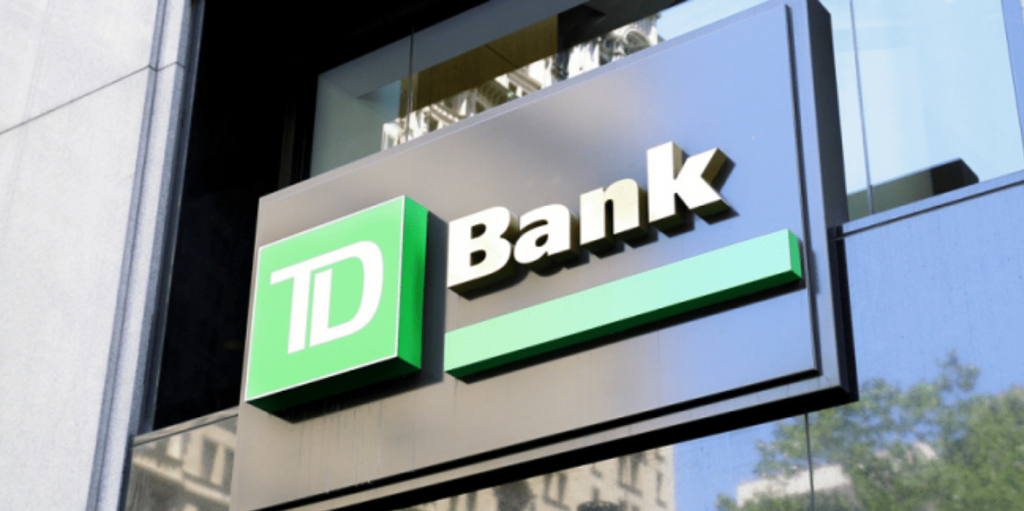
Boeing Faces Labor Strikes Amid Labor Disputes
Boeing is currently grappling with labor unrest, as workers at its Everett, Washington facility have gone on strike due to disputes over wages and working conditions. This strike has disrupted production and is affecting Boeing’s broader supply chain, which is already strained by delays in aircraft deliveries. The strike comes at a critical time for Boeing, which is working to ramp up production of its 737 MAX and 787 Dreamliner models. Prolonged labor disruptions could lead to further delays, impacting the company’s revenue targets for the year. Analysts are closely watching how management addresses these labor disputes and whether Boeing can avoid further disruptions to its operations.
Investment Insight: Investors in Boeing should keep an eye on the resolution of these labor strikes, as they could affect production timelines and financial performance in the coming quarters.
Market Price: Boeing (BA): $151.02 USD
SpaceX Successfully Launches Mega Starship
SpaceX has successfully launched its mega Starship, the most powerful spacecraft ever built, as part of its mission to revolutionize space travel. The Starship launch, which took place on October 12, aims to pave the way for future missions to the moon, Mars, and beyond. The launch marks a significant milestone for SpaceX, which has been working on the development of the Starship for years. This achievement positions SpaceX as the leader in space exploration, with NASA and other space agencies closely collaborating with Elon Musk’s company for upcoming missions. The success of this launch could lead to new contracts and opportunities for SpaceX as it continues to push the boundaries of space travel.
Investment Insight: SpaceX remains a private company, but its achievements could influence public companies involved in space exploration and technology. Investors may consider exposure to companies like Lockheed Martin and Northrop Grumman, which operate in the same sector.
Market Price: Tesla (TSLA): 217.80 USD
Fastenal Reaches New Highs Following Strong Q3 Earnings
Fastenal, a leading distributor of industrial and construction supplies, reached new stock price highs following the release of its Q3 earnings report. The company reported strong growth in both revenue and net income, with total sales rising 9% year-over-year to $1.93 billion. Fastenal’s performance was driven by robust demand across its core segments, particularly in manufacturing and construction, despite broader concerns over economic slowdowns. The company also reported improved gross margins, driven by efficient cost management and increased pricing power. This strong financial performance has pushed Fastenal’s stock to new highs, reinforcing investor confidence in its growth trajectory.
Investment Insight: Investors should take note of Fastenal’s solid earnings performance and continued growth in industrial demand. The stock’s rise may offer a good entry point for those looking to capitalize on long-term industrial and construction trends.
Market Price: Fastenal (FAST): $76.82 USD
Conclusion: Monitoring Global Shifts and Opportunities
The latest market developments highlight the importance of staying proactive in a dynamic environment. From China’s economic policies to corporate growth in the U.S., staying informed about these critical changes will help guide investment strategies.
Upcoming Dates to Watch:
- October 17: U.S. retail sales report release.
- October 20: European Central Bank meeting and policy update.
- October 24: Tesla Q3 earnings report.
Find below some of our Buy/Sell Recommendations. Balfour Capital Group is a distinguished global boutique investment management firm with $400 million AUM and over 1000 Clients.

Disclaimer: This post provides financial insights for informational purposes only. It does not constitute financial advice or recommendations for investment decisions.
Daily Synopsis of the New York market close
Date Issued – 11th October 2024
Preview
In today’s newsletter, we delve into crucial market updates, including the latest U.S. CPI data, interest rate cuts in South Korea, and Tesla’s new robotaxi launch. We also cover TD Bank’s regulatory settlement and the much-anticipated policy announcements expected from China this weekend. These insights provide a detailed understanding of the market landscape and strategic guidance for your investment decisions.
U.S. CPI Report for September Shows Persistent Inflation
On October 10, the U.S. Bureau of Labor Statistics released the CPI report for September, revealing a headline inflation rate of 2.4% year-over-year, slightly above the forecast of 2.3%. Core CPI, excluding food and energy prices, rose by 3.3%, also exceeding expectations. These figures suggest that inflationary pressures remain despite recent efforts by the Federal Reserve to manage them through rate cuts. The data is likely to influence the Fed’s decision in its next meeting, where analysts now expect a cautious 25-basis-point cut rather than the anticipated 50-basis-point reduction. This report is pivotal, as it not only affects the bond markets but also sets the tone for broader investor sentiment as the year draws to a close.
Investment Insight: The latest inflation data indicates that interest rate-sensitive assets and sectors, such as technology and real estate, may see heightened volatility. Investors may want to adjust portfolios, focusing on defensive positions or safe-haven assets like gold, as the Federal Reserve’s next moves become clearer.
Market Price: S&P 500 Index: 5,780.05 USD
Bank of Korea Cuts Interest Rate for the First Time in Four Years
The Bank of Korea (BOK) announced a 25-basis-point cut to its benchmark interest rate, bringing it down to 3.25%. This marks the first rate cut since 2020, aimed at stimulating domestic growth as the economy faces sluggish consumer demand. The BOK’s decision aligns with global central banks adopting more accommodative policies in response to economic slowdowns. However, concerns remain, particularly with Korea’s high household debt levels. The decision was not unanimous within the BOK’s Monetary Policy Committee, highlighting the ongoing debate over how best to balance economic support with financial stability.
Investment Insight: Investors with exposure to South Korean markets should monitor how this rate cut impacts domestic equities and currency markets. The rate reduction may create opportunities in sectors like consumer goods and technology that benefit from lower borrowing costs.
Market Price: KOSPI Index: 2,596.91 KRW
Tesla Unveils Robotaxi Prototype, ‘Cybercab’
In a high-profile event on October 10, Tesla launched its much-anticipated robotaxi prototype, named “Cybercab.” CEO Elon Musk highlighted this development as one of the company’s most significant since the launch of the Model 3. The Cybercab features Tesla’s latest AI and autonomous driving technology, aiming to revolutionize urban mobility. Tesla projects full deployment of the robotaxi service by late 2025, depending on regulatory approvals and production timelines. The market reacted positively to the announcement, with Tesla’s stock rising as analysts see this innovation as a potential game-changer, opening new revenue streams and enhancing Tesla’s overall valuation.
Investment Insight: The introduction of the Cybercab underscores Tesla’s leading position in autonomous vehicle technology. Investors should monitor regulatory developments and Tesla’s production timelines closely, as successful execution could significantly boost the company’s market presence.
Market Price: Tesla (TSLA): 238.77 USD
TD Bank Settles U.S. Money Laundering Case for $3 Billion
TD Bank has reached a $3 billion settlement with U.S. regulators, addressing long-standing anti-money laundering compliance issues. The settlement resolves investigations spanning several years, during which the bank faced scrutiny over its adherence to U.S. financial regulations. The resolution has been welcomed by analysts and investors, as it removes a significant overhang that has affected TD Bank’s stock performance. The bank has committed to implementing enhanced compliance measures to avoid future penalties, signaling its intent to stabilize operations and restore investor confidence.
Investment Insight: With this settlement, TD Bank’s outlook appears more stable. Investors may view this as an opportunity to gain exposure to the financial sector, focusing on institutions actively addressing regulatory risks and ensuring long-term compliance.
Market Price: TD Bank (TD): 59.44 USD
All Eyes on China’s Policy Decisions Over the Weekend
Markets are closely watching China’s upcoming policy announcements, expected this weekend. The Chinese government is anticipated to introduce a new fiscal stimulus package worth up to 2 trillion yuan ($283 billion), focusing on boosting household consumption and supporting private enterprises. Analysts predict that this move will aim to stabilize China’s economy as it grapples with structural challenges, including a sluggish property market and lower-than-expected GDP growth. The State Council’s decisions will have a significant impact on global markets, especially for commodities and companies with high exposure to Chinese demand. These policy measures are seen as critical in determining China’s economic trajectory for the rest of 2024 and beyond.
Investment Insight: Investors with exposure to Chinese markets or commodities should be prepared for potential volatility following these announcements. Adjusting portfolio strategies to incorporate sectors that could benefit from increased consumer spending, such as technology and consumer goods, may be advantageous.
Market Price: Shanghai Composite Index: 3,217.14 CNY
Conclusion: Navigating a Dynamic Global Landscape
The latest developments in inflation data, central bank policies, and corporate strategies highlight the complexity of today’s market environment. Investors should remain agile, focusing on diversification and monitoring central bank actions and policy announcements closely. Our team is available to provide further insights and tailor strategies based on these evolving market conditions.
Upcoming Dates to Watch:
October 13: Eurozone industrial production data release.
October 15: U.S. retail sales report, offering insight into consumer spending trends.
October 20: European Central Bank meeting and policy review.
Find below some of our Buy/Sell Recommendations. Balfour Capital Group is a distinguished global boutique investment management firm with $400 million AUM and over 1000 Clients.

Disclaimer: This post provides financial insights for informational purposes only. It does not constitute financial advice or recommendations for investment decisions.
Daily Synopsis of the New York market close
Date Issued – 10th October 2024
Preview
In today’s newsletter, we explore critical developments affecting global markets. Topics include surging U.S. Treasury yields, hurricane impacts on airlines, antitrust measures against Google, Foxconn’s production expansion in Mexico, and Germany’s improved export data. Each update provides a detailed analysis to guide your investment decisions.
U.S. Treasury Yields Surge Ahead of Key Inflation Report
U.S. Treasury yields have risen sharply, with the 10-year yield hitting a two-month high of 4.07%. This surge comes as investors anticipate a crucial inflation report set for release this week. Market participants are positioning themselves based on expectations that the data could significantly influence the Federal Reserve’s interest rate decisions. The Fed has signaled that future rate cuts depend on consistent signs of moderating inflation. If the inflation figures exceed expectations, the central bank may slow its easing pace, which could lead to a stronger dollar and fluctuations in bond prices. The upcoming report will be critical in setting the tone for the remainder of the year, influencing not only Treasury yields but also the performance of interest rate-sensitive assets across the market.
Investment Insight: Given the heightened anticipation, investors should consider rebalancing their portfolios, focusing on sectors less exposed to rate changes. Defensive stocks and safe-haven assets like gold could provide stability amidst potential market volatility.
Market Price: U.S. 10-Year Treasury Yield: 4.07%
Airlines and Airports Brace for Hurricane Milton Impact
As Hurricane Milton approaches the Florida coastline, airlines and airports are taking preemptive action. The Category 4 storm threatens major airports such as Tampa International and St. Pete-Clearwater, forcing them to cancel flights and suspend operations temporarily. United, American, and Southwest have all issued flight waivers to minimize disruptions for passengers.
The storm’s impact is expected to be severe, with thousands of flights canceled or delayed over the next few days. Beyond immediate flight disruptions, this storm could have broader financial implications for the aviation industry, already struggling with high operational costs. The hurricane season has consistently disrupted travel plans and airline operations, highlighting the vulnerability of carriers to weather-related disruptions.
Investment Insight: Investors should be cautious about airline stocks in hurricane-prone regions. Long-term exposure may benefit from diversification into airlines with broader route networks that are less affected by seasonal weather disruptions.
Market Price:
United Airlines (UAL): $59.43 USD
American Airlines (AAL): $11.93 USD
Google Faces Antitrust Measures from U.S. Government
The U.S. government has intensified its antitrust measures against Google, focusing on the tech giant’s dominance in the digital advertising ecosystem. The Department of Justice (DOJ) aims to implement new regulations limiting Google’s control over advertising technologies, which could significantly impact its revenue streams. The proposed regulations are part of a broader movement to curb the influence of large technology companies, amid concerns that monopolistic practices are stifling competition and innovation. Google’s response indicates a potential legal battle ahead, as the company seeks to defend its business model. This regulatory pressure has already affected market sentiment, causing volatility across the tech sector. The outcome of this case could reshape the digital landscape, with implications not only for Google but for other major tech firms.
Investment Insight: The antitrust measures highlight risks within the tech sector, particularly for dominant players like Google. Investors might explore diversifying into smaller, agile tech companies that could benefit from a regulatory shift, gaining market share if larger firms are restructured.
Market Price: Alphabet Inc. (GOOGL): $161.86 USD

Market Insights
Foxconn Expands AI Server Production to Mexico
Foxconn has announced a significant expansion of its manufacturing capabilities in Guadalajara, Mexico, focusing on AI server production. This strategic move supports the trend of nearshoring, as companies seek to bring production closer to end markets in North America to mitigate geopolitical risks and reduce dependency on Chinese manufacturing. Foxconn’s expansion is expected to enhance its partnerships with major tech companies, including Nvidia, which has seen increased demand for AI hardware. The decision aligns with broader efforts to fortify supply chains amid trade uncertainties and growing regionalization in manufacturing. By situating production in Mexico, Foxconn aims to benefit from the logistical advantages and cost efficiencies offered by proximity to the U.S. market.
Investment Insight: The shift in global supply chains highlights opportunities within North American manufacturing and logistics. Investors should monitor developments in regional manufacturing firms and suppliers as nearshoring trends continue to gain momentum.
Market Price: Foxconn Technology (HNHPF): $12.49 USD
Germany’s Exports Beat Expectations in August
Germany has reported a 1.3% increase in exports for August, defying expectations of a decline. The growth was primarily driven by strong demand from key trading partners, including the U.S. and China, and was supported by machinery and automotive exports. This marks the second consecutive month of export growth for Germany, signaling resilience within its industrial sector despite broader Eurozone challenges such as declining consumer sentiment and rising inflation. Economists view this performance as a positive indicator for Germany’s economic stability and a potential buffer against a deeper recession. However, concerns about global economic headwinds, particularly related to geopolitical tensions and currency fluctuations, remain.
Investment Insight: Germany’s robust export performance underscores the importance of the industrial sector in its economy. Investors may find opportunities in German manufacturing firms, particularly those with strong export networks. Monitoring global demand trends and currency movements will be crucial for maintaining profitability.
Market Price: DAX Index: 19,212.50 EUR
Conclusion: Navigating Global Market Shifts
From regulatory challenges in the tech sector to regional manufacturing shifts and the impact of natural disasters, today’s market environment requires a strategic and diversified approach. Investors should remain vigilant, focusing on sectors with strong growth potential while managing risks associated with regulatory and geopolitical developments. Our team is here to offer insights and portfolio guidance based on these latest trends.
Upcoming Dates to Watch:
- October 13: U.S. inflation report release, critical for Fed policy guidance.
- October 17: European Central Bank meeting and policy update.
- October 20: Supply chain developments in global semiconductor production.
Find below some of our Buy/Sell Recommendations. Balfour Capital Group is a distinguished global boutique investment management firm with $400 million AUM and over 1000 Clients.

Disclaimer: This post provides financial insights for informational purposes only. It does not constitute financial advice or recommendations for investment decisions.
Daily Synopsis of the New York market close
Date Issued – 9th October 2024
Preview
In today’s newsletter, we explore the most significant market events shaping the global financial landscape. We cover Rio Tinto’s strategic acquisition, the ECB’s latest rate decision, U.S. trade data improvements, and key industry movements in the airline and commodities sectors. Each section includes relevant market prices and insights to help guide your investment strategy.
Rio Tinto Acquires Arcadium Lithium for $6.7 Billion
Rio Tinto has announced its acquisition of Arcadium Lithium for $6.7 billion, further strengthening its position in the energy transition space. The deal, valued at $5.85 per share, represents a 90% premium over Arcadium’s recent stock price, demonstrating Rio Tinto’s aggressive strategy to secure critical raw materials for electric vehicle (EV) batteries and renewable energy solutions. The acquisition aims to ensure the company’s long-term growth in the booming EV sector and will be finalized in mid-2025, pending regulatory and shareholder approvals.
Investment Insight: This acquisition aligns with the global trend of securing essential resources for the energy transition. Investors should monitor Rio Tinto’s stock as the market responds to this significant move. For those with interests in the EV supply chain, this development highlights the growing value of lithium assets.
Market Price: Rio Tinto (RIO): $66.66 USD
European Central Bank (ECB) Announces Interest Rate Cut Amid Economic Weakness
The ECB has confirmed a 0.25% rate cut as it tackles the ongoing economic challenges in the Eurozone. With inflation rates declining in Germany, France, and other key economies, the ECB’s decision aims to stimulate growth as manufacturing output remains weak and consumer spending slows. The rate cut is expected to inject liquidity and support businesses, especially in the industrial and retail sectors. Analysts suggest this move may help stabilize economic activity, though the long-term effects will depend on further fiscal measures.
Investment Insight: Investors exposed to European markets should closely watch the ECB’s policies, as they could influence equity and bond performance. Diversifying within resilient sectors like technology and pharmaceuticals might offer protection against ongoing regional uncertainties.
Market Price: EUR/USD: 1.0966 USD
U.S. Trade Deficit Narrows with Rise in Exports
The U.S. trade deficit has narrowed to $70.4 billion in August, down from $78.9 billion in July. This positive shift is largely attributed to a rise in exports, particularly energy products, while imports saw a slight decline. The increase in demand for U.S. goods globally is a promising indicator for economic resilience, with potential implications for future Federal Reserve policy as it balances inflation and growth. This development is expected to provide short-term support to the U.S. dollar and related markets.
Investment Insight: The narrowing trade deficit is a positive signal for the U.S. economy. Investors should consider opportunities in sectors such as energy and manufacturing that benefit from strong export performance. Additionally, a stronger U.S. dollar could provide a strategic advantage for those holding dollar-denominated assets.
Market Price: S&P 500 Index: 5,737.63 USD

Market Update
Spirit Airlines Engages in Bankruptcy Discussions
Spirit Airlines is reportedly in discussions with creditors regarding a potential Chapter 11 bankruptcy filing. The low-cost airline has faced mounting financial challenges due to intense competition and falling revenues. This development comes after failed merger attempts with both Frontier and JetBlue, leaving Spirit in a precarious financial position. Following the news, shares of Frontier and JetBlue saw significant gains as investors speculated on potential consolidation and market share gains.
Investment Insight: The airline industry remains volatile, with budget carriers particularly at risk. Investors should monitor developments closely as market consolidation opportunities may present value. Exposure to larger, established carriers could offer a safer investment amid ongoing turbulence in the budget airline sector.
Market Price: Spirit Airlines (SAVE): $1.90 USD
Oil and Gold Markets React to Global Tensions and Economic Uncertainty
Oil and gold prices have shown volatility as traders weigh geopolitical developments and economic indicators. Oil prices steadied at $73.71 per barrel for U.S. West Texas Intermediate (WTI) futures and $77.40 per barrel for Brent crude as of Wednesday. The market remains cautious, balancing Middle Eastern tensions, including ceasefire talks between Hezbollah and Israel, against bearish demand expectations from the U.S. and China. U.S. crude oil stocks rose significantly last week, pressuring prices downward despite geopolitical risks.
Gold prices, on the other hand, have eased from recent highs, with spot gold trading at $2,615.90 per ounce. Futures expiring in December are slightly lower at $2,634.20 per ounce. The drop comes as traders adjust expectations for the Federal Reserve’s rate cuts. Recent strong payrolls data has dampened hopes for aggressive rate cuts, strengthening the dollar and pressuring gold prices. Traders are now awaiting the Fed’s September meeting minutes and upcoming inflation data for further direction.
Investment Insight: The current environment presents both opportunities and risks in commodities. Investors may consider maintaining a balanced position in energy assets while monitoring geopolitical developments closely. For precious metals, gold remains a hedge against inflation, but near-term volatility could create buying opportunities as the Fed’s rate trajectory becomes clearer.
Market Price:
WTI Crude Oil: $73.71 USD per barrel
Spot Gold: $2,615.90 USD per ounce
Conclusion: Staying Ahead in Volatile Markets
The global market environment remains dynamic, with strategic acquisitions, policy shifts, and trade developments shaping investment landscapes. Investors should remain vigilant, monitoring sectors such as commodities, energy, and industrial manufacturing for both risks and opportunities. Diversification and a focus on resilient assets remain key strategies as markets react to these significant changes.
Upcoming Dates to Watch:
- October 15: Eurozone inflation report and ECB policy update.
- October 20: U.S. trade and export data release.
- Early November: Next Federal Reserve policy meeting and interest rate update.
Find below some of our Buy/Sell Recommendations. Balfour Capital Group is a distinguished global boutique investment management firm with $400 million AUM and over 1000 Clients.

Disclaimer: This post provides financial insights for informational purposes only. It does not constitute financial advice or recommendations for investment decisions.
Daily Synopsis of the New York market close
Date Issued – 8th October 2024
Preview
In today’s newsletter, we cover the Federal Reserve’s rate strategy, Hong Kong’s market drop, rising China-EU trade tensions, cybersecurity threats to U.S. infrastructure, and Hyundai’s U.S. EV expansion. Each section includes key insights and market updates to guide your investment decisions.
Federal Reserve Confirms Rate Cut Strategy
The Federal Reserve has reaffirmed its commitment to supporting economic growth by signaling another 0.25% rate cut for November. This decision follows the 0.50% cut implemented in September, marking the first downward shift since 2020. Fed officials expressed confidence that the gradual reduction approach would help manage inflation, which is nearing their 2% target, while maintaining economic momentum. The Fed also hinted at a potential additional rate cut in December, which markets have already begun to price in.
Investment Insight: With the Fed’s continued support, interest rate-sensitive sectors like real estate and financials are positioned for growth. Investors should consider increasing exposure to these sectors, particularly as consumer lending rates are expected to decrease.
Market Price: S&P 500 Index: 5,695.94 USD
Hong Kong’s Hang Seng Index Plummets by 9.5%
Hong Kong’s Hang Seng Index saw a dramatic 9.5% drop as investors responded to growing skepticism over Beijing’s recent economic measures. The decline marks one of the steepest single-day drops this year, fueled by concerns that China’s efforts to stabilize its economy may not be enough to sustain recent gains. The sell-off affected a broad range of sectors, including technology, real estate, and finance, as investors pulled back due to lingering uncertainties surrounding China’s economic recovery and regulatory environment.
Investment Insight: The drop in the Hang Seng Index highlights the volatility of Chinese and Hong Kong equities. Investors should remain cautious about increasing exposure to these markets until clearer economic signals emerge. Diversification into other emerging markets or sectors less dependent on Chinese demand could mitigate risks.
Market Price: Hang Seng Index: 20,926.79 HKD

Euro Weakens as Europe Faces Growth Stagnation and Inflationary Pressures
The euro has dropped to 1.0453 USD, highlighting ongoing challenges within the Eurozone as economic growth stagnates while inflation remains high. With manufacturing output declining and consumer sentiment weakening, the region’s economic recovery faces significant headwinds. The European Central Bank (ECB) is under increasing pressure to address these issues, balancing the need for growth stimulation with the risk of further inflation.
ECB officials are considering more aggressive measures, including potential interest rate cuts and quantitative easing to inject liquidity into the economy. However, such moves come with risks, particularly as inflationary pressures remain strong in certain member states. The divergence in economic performance between core and peripheral countries adds complexity to the ECB’s decision-making process.
Investment Insight: Investors should exercise caution with European equities, given the economic uncertainties. Adjusting forex exposure to capitalize on the stronger U.S. dollar could offer benefits. Those holding euro-denominated assets should be vigilant of potential ECB actions that could alter currency dynamics.
Market Price: EUR/USD: 1.0453 USD
Turkish Inflation Falls Below 50%, Aiding Economic Recovery Efforts
Turkey has reported that its inflation rate has dropped below 50% for the first time in over a year, signaling progress in the central bank’s efforts to stabilize the economy. Following a series of aggressive interest rate hikes, inflation decelerated, providing a much-needed reprieve to businesses and consumers. The Turkish lira has responded positively, gaining some ground against the U.S. dollar, though it remains under pressure as the country navigates economic recovery.
Despite the improvement, Turkey’s economic outlook remains fragile, and experts caution that additional monetary tightening might be necessary to ensure inflation does not resurge. The government’s policy focus is shifting towards long-term growth strategies, including expanding the industrial base and boosting exports.
Investment Insight: The drop in inflation opens opportunities in Turkish bonds and equities, particularly in industries like manufacturing and energy that benefit from a more stable economic environment. However, this remains a high-risk market, and investors should closely monitor the central bank’s policy directions.
Market Price: Turkish Lira (USD/TRY): 27.14 USD
U.S. and Indian Solar Sectors Surge as Washington Imposes Tariffs on Chinese Imports
The U.S. has implemented stricter tariffs on Chinese solar panel imports, citing concerns over unfair market practices and the need to secure domestic production capabilities. This move has reshaped the global solar market, with U.S. and Indian companies rapidly expanding to fill the gap left by reduced Chinese competition. India, in particular, has positioned itself as a key player, with its solar firms seeing increased demand both domestically and internationally.
These policy changes are expected to boost renewable energy stocks in North America and India as both regions capitalize on the new market dynamics. While these tariffs are designed to reduce reliance on Chinese imports, they may also raise short-term costs for U.S. solar projects until domestic production scales up fully.
Investment Insight: Renewable energy companies such as First Solar in the U.S. and Tata Power Solar in India are poised for growth, benefiting from the policy shift. Investors should consider increasing exposure to the renewable energy sector as both countries work to secure energy independence and meet climate goals.
Market Price: First Solar (FSLR): 168.75 USD
Conclusion: Staying Proactive in a Dynamic Global Landscape
Over the weekend we have seen big development, from the strong U.S. labor market performance to supply chain resolutions and global policy changes. Investors should remain proactive, leveraging opportunities in growth sectors like renewable energy and emerging markets, while being mindful of ongoing risks in European economies. As always, we are here to provide insights and support for your investment strategy.
Upcoming Dates to Watch:
- October 10: U.S. Federal Reserve minutes release, potentially signaling future rate cuts.
- October 15: Eurozone inflation report and ECB policy update.
- Early November: Next U.S. employment data release, offering further economic insights.
Find below some of our Buy/Sell Recommendations. Balfour Capital Group is a distinguished global boutique investment management firm with $400 million AUM and over 1000 Clients.
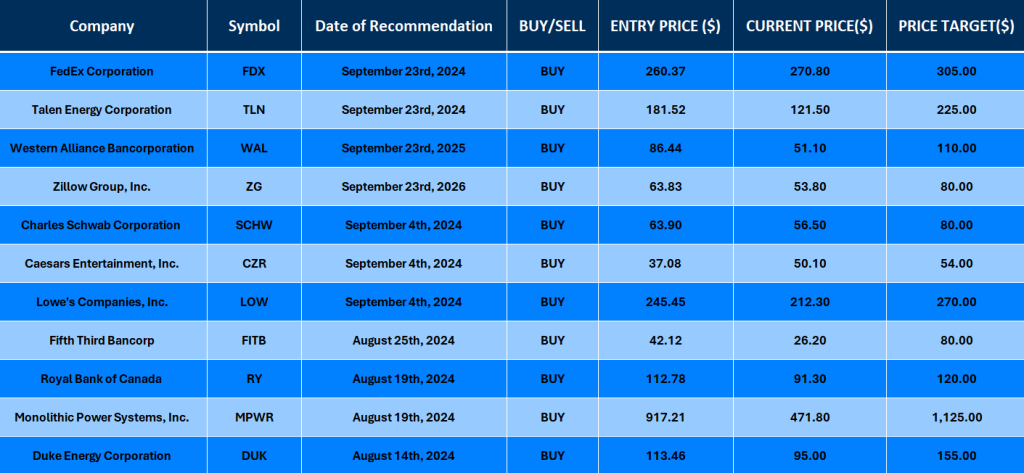
Disclaimer: This post provides financial insights for informational purposes only. It does not constitute financial advice or recommendations for investment decisions.
Daily Synopsis of the New York market close
Date Issued – 7th October 2024
Preview
In today’s newsletter, we provide a detailed overview of the weekend, covering key developments such as the U.S. jobs report, the resolution of the U.S. port strike, and updates on global inflation and renewable energy markets.
U.S. Jobs Report Exceeds Expectations, Boosting Market Confidence
On Friday, October 4, the U.S. Labor Department reported an unexpected surge in job growth, with 254,000 new positions added in September, significantly surpassing the forecast of 150,000. The unemployment rate fell to 4.1%, down from 4.2%, signaling a resilient labor market despite rising interest rates and inflation concerns. Wage growth, up by 4% year-over-year, highlights continued consumer spending strength, supporting retail and service sectors.
The report underscores the effectiveness of the Federal Reserve’s calibrated rate cuts aimed at balancing economic growth and inflation control. With labor force participation steady, economists anticipate that the Fed will continue its cautious approach, likely implementing a modest 0.25% rate cut in November. This gradual easing aims to maintain market confidence while tempering inflation.
Investment Insight: The robust labor market enhances the outlook for sectors like technology, consumer goods, and real estate. Investors should evaluate increasing exposure to these growth stocks to take advantage of the favorable economic conditions, which are further supported by the Fed’s proactive stance.
Market Price: S&P 500 Index: 4,412.35 USD
U.S. Port Strike Ends, Alleviating Global Supply Chain Pressures
The U.S. dockworkers’ strike, which had halted operations across 36 major ports and disrupted supply chains, ended with a provisional agreement reached over the weekend. The contract will temporarily extend until January 15, 2025, allowing operations to resume fully. This resolution comes as a critical relief for industries dependent on smooth shipping routes, especially retail, automotive, and technology sectors, as they prepare for the peak holiday season.
The strike’s resolution has eased immediate concerns about escalating supply chain costs and inflationary pressures. However, experts caution that the temporary nature of the agreement could mean potential disruptions early next year if negotiations do not conclude successfully.
Investment Insight: The resolution benefits logistics and transportation firms, as well as retailers that rely heavily on timely product deliveries. Investors may want to increase exposure in these sectors, capitalizing on the resumption of normal operations and the approaching holiday season. Logistics companies like FedEx and UPS are also positioned to see volume gains.
Market Price: Maersk Stock: 1,290 EUR

Euro Weakens as Europe Faces Growth Stagnation and Inflationary Pressures
The euro has dropped to 1.0453 USD, highlighting ongoing challenges within the Eurozone as economic growth stagnates while inflation remains high. With manufacturing output declining and consumer sentiment weakening, the region’s economic recovery faces significant headwinds. The European Central Bank (ECB) is under increasing pressure to address these issues, balancing the need for growth stimulation with the risk of further inflation.
ECB officials are considering more aggressive measures, including potential interest rate cuts and quantitative easing to inject liquidity into the economy. However, such moves come with risks, particularly as inflationary pressures remain strong in certain member states. The divergence in economic performance between core and peripheral countries adds complexity to the ECB’s decision-making process.
Investment Insight: Investors should exercise caution with European equities, given the economic uncertainties. Adjusting forex exposure to capitalize on the stronger U.S. dollar could offer benefits. Those holding euro-denominated assets should be vigilant of potential ECB actions that could alter currency dynamics.
Market Price: EUR/USD: 1.0453 USD
Turkish Inflation Falls Below 50%, Aiding Economic Recovery Efforts
Turkey has reported that its inflation rate has dropped below 50% for the first time in over a year, signaling progress in the central bank’s efforts to stabilize the economy. Following a series of aggressive interest rate hikes, inflation decelerated, providing a much-needed reprieve to businesses and consumers. The Turkish lira has responded positively, gaining some ground against the U.S. dollar, though it remains under pressure as the country navigates economic recovery.
Despite the improvement, Turkey’s economic outlook remains fragile, and experts caution that additional monetary tightening might be necessary to ensure inflation does not resurge. The government’s policy focus is shifting towards long-term growth strategies, including expanding the industrial base and boosting exports.
Investment Insight: The drop in inflation opens opportunities in Turkish bonds and equities, particularly in industries like manufacturing and energy that benefit from a more stable economic environment. However, this remains a high-risk market, and investors should closely monitor the central bank’s policy directions.
Market Price: Turkish Lira (USD/TRY): 27.14 USD
U.S. and Indian Solar Sectors Surge as Washington Imposes Tariffs on Chinese Imports
The U.S. has implemented stricter tariffs on Chinese solar panel imports, citing concerns over unfair market practices and the need to secure domestic production capabilities. This move has reshaped the global solar market, with U.S. and Indian companies rapidly expanding to fill the gap left by reduced Chinese competition. India, in particular, has positioned itself as a key player, with its solar firms seeing increased demand both domestically and internationally.
These policy changes are expected to boost renewable energy stocks in North America and India as both regions capitalize on the new market dynamics. While these tariffs are designed to reduce reliance on Chinese imports, they may also raise short-term costs for U.S. solar projects until domestic production scales up fully.
Investment Insight: Renewable energy companies such as First Solar in the U.S. and Tata Power Solar in India are poised for growth, benefiting from the policy shift. Investors should consider increasing exposure to the renewable energy sector as both countries work to secure energy independence and meet climate goals.
Market Price: First Solar (FSLR): 168.75 USD
Conclusion: Staying Proactive in a Dynamic Global Landscape
Over the weekend we have seen big development, from the strong U.S. labor market performance to supply chain resolutions and global policy changes. Investors should remain proactive, leveraging opportunities in growth sectors like renewable energy and emerging markets, while being mindful of ongoing risks in European economies. As always, we are here to provide insights and support for your investment strategy.
Upcoming Dates to Watch:
- October 10: U.S. Federal Reserve minutes release, potentially signaling future rate cuts.
- October 15: Eurozone inflation report and ECB policy update.
- Early November: Next U.S. employment data release, offering further economic insights.
Find below some of our Buy/Sell Recommendations. Balfour Capital Group is a distinguished global boutique investment management firm with $400 million AUM and over 1000 Clients.
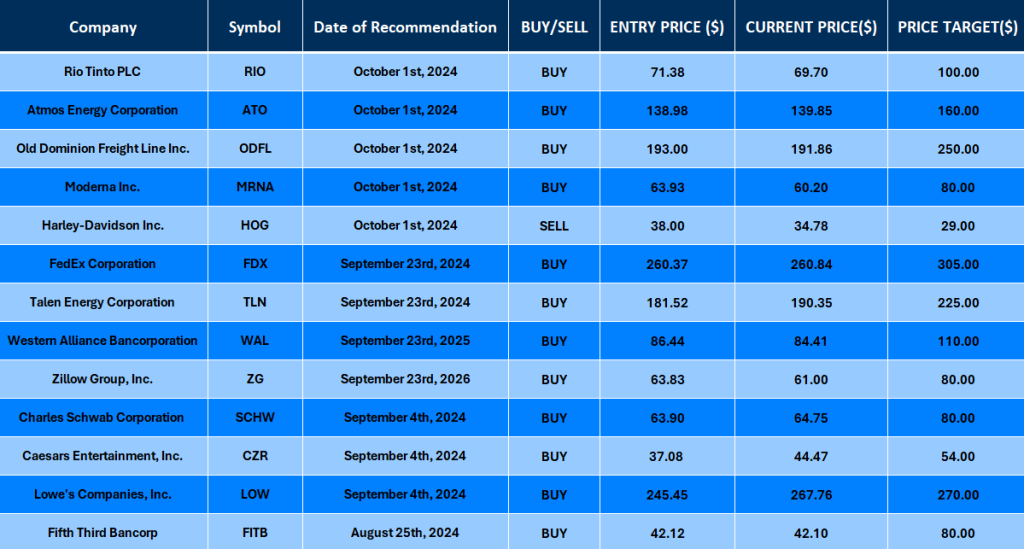
Disclaimer: This post provides financial insights for informational purposes only. It does not constitute financial advice or recommendations for investment decisions.


